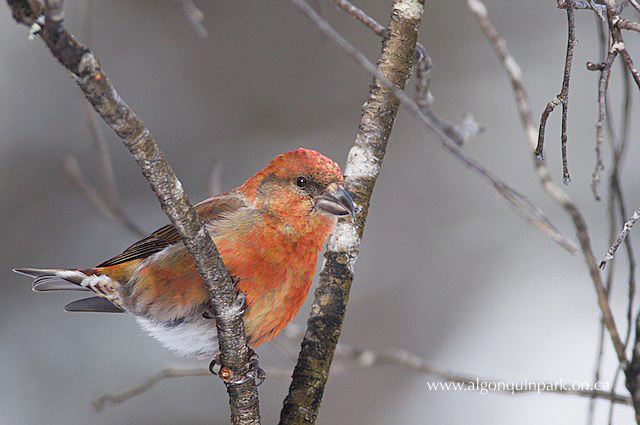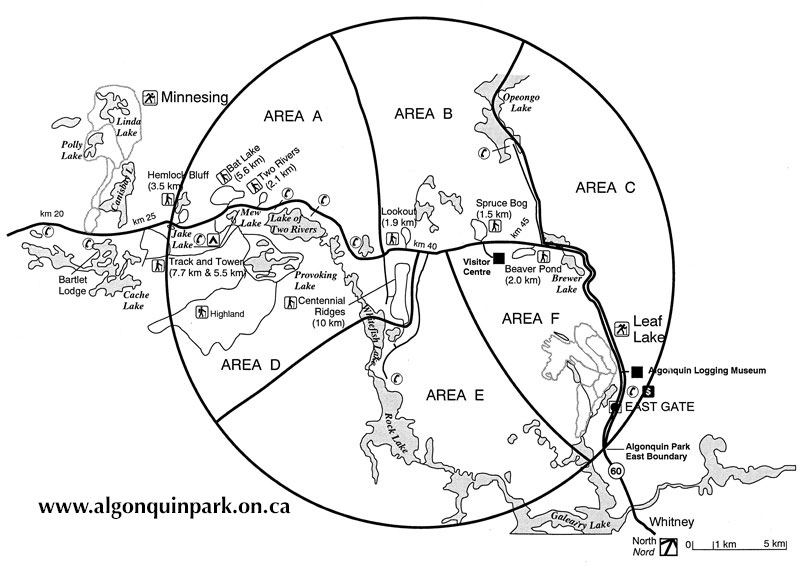Events Calendar
Current Weather
January 1, 2024
Christmas Bird Count Results 2023
Image: Red Crossbill in Algonquin Park. Photo by Lev Frid.
Overall Results
The 50th Algonquin Park Christmas Bird Count was held on Saturday, December 30, 2023.
The birding conditions were perhaps the best ever in the 50 years of this count: light winds, cloudy with no precipitation, fairly mild (minus 5°C to minus 4°C), nearly all ground bare which really helped in this mostly on-foot count, and a good tree seed crop that attracted lots of finches.
The 35 species observed was a new high, with 34 having been observed on three previous counts, and an average tally of 27. The total individuals reported was 12,252 ( average: 4,459 and highest: 17,252). There were 111 observers (previous highest: 110).
Record High Totals (with previous highs in brackets): Bohemian Waxwing 8 (3), Hoary Redpoll 4 (2), Pine Siskin 5,314 (4,214).
Unusual species for this count: Northern Saw-whet Owl (1), American Crow (6), Bohemian Waxwing (8), Hoary Redpoll (4), White-throated Sparrow (2).
Finches: Evening Grosbeak (336), Pine Grosbeak (14), Purple Finch (537), Common Redpoll (1,075), Hoary Redpoll (4), Red Crossbill (1,330), White-winged Crossbill (459), Pine Siskin (5,314), American Goldfinch (171).
Thanks to all our observers, The Friends of Algonquin Park and Ontario Parks for their contributions to this excellent count.
Happy New Year.
Ron Tozer
Compiler (1974 to 2023)
Additional Bird Sightings
Please send us any bird sightings you've had in the park, even of common birds, as they assist us in documenting Algonquin Park's bird life.
Birders reporting records through eBird are encouraged to share their lists with the Algonquin Park Bird Records account (APPbirds).
Christmas Bird Count Circle in Algonquin Park
Bird count volunteers follow specified routes through a designated 24 kilometre diameter circle (shown below) and count every bird they see or hear with a 24 hour period. This provides an early winter bird census for Algonquin Park and combines with data from other counts in Canada, the United States, and many other countries. In Algonquin Park, the 24 kilometre circle is centred on the intersection of the Rock Lake Road and Highway 60.
What is the Christmas Bird Count?
The Christmas Bird Count (CBC) is a long-standing program of the National Audubon Society, with over 100 years of citizen science involvement. It is an early-winter bird census, where thousands of volunteers across the US, Canada and many countries in the Western Hemisphere, go out over a 24 hour period to count birds.
How is the Christmas Bird Count conducted?
Count volunteers follow specified routes through a designated 24 kilometre diameter circle, counting every bird they see or hear all day. It’s not just a species tally—all birds are counted all day, giving an indication of the total number of birds in the circle that day. If observers live within a CBC circle, they may arrange in advance to count the birds at their feeders and submit those data to their compiler. All individual CBC’s are conducted in the period from December 14 to January 5 (inclusive dates) each season, and each count is conducted in one calendar day.
Why was the Christmas Bird Count started?
The first CBC was done on Christmas Day of 1900 as an alternative activity to an event called the “side hunt” where people chose sides, then went out and shot as many birds as they could. The group that came in with the largest number of dead birds won the event. Frank Chapman, a famed ornithologist at the American Museum of Natural History and the editor of Bird-Lore (which became the publication of the National Association of Audubon Societies when that organization formed in 1905) recognized that declining bird populations could not withstand wanton over-hunting, and proposed to count birds on Christmas Day rather than shoot them.
Is the Christmas Bird Count useful?
Absolutely. The data collected by observers over the past century allow researchers, conservation biologists, and interested individuals to study the long-term health and status of bird populations across North America.
Related Information
Reserve your developed or backcountry campsite for your next visit.
Share your passion for Algonquin Park by becoming a member or donor.
Special regulations for Algonquin's special fishery.











